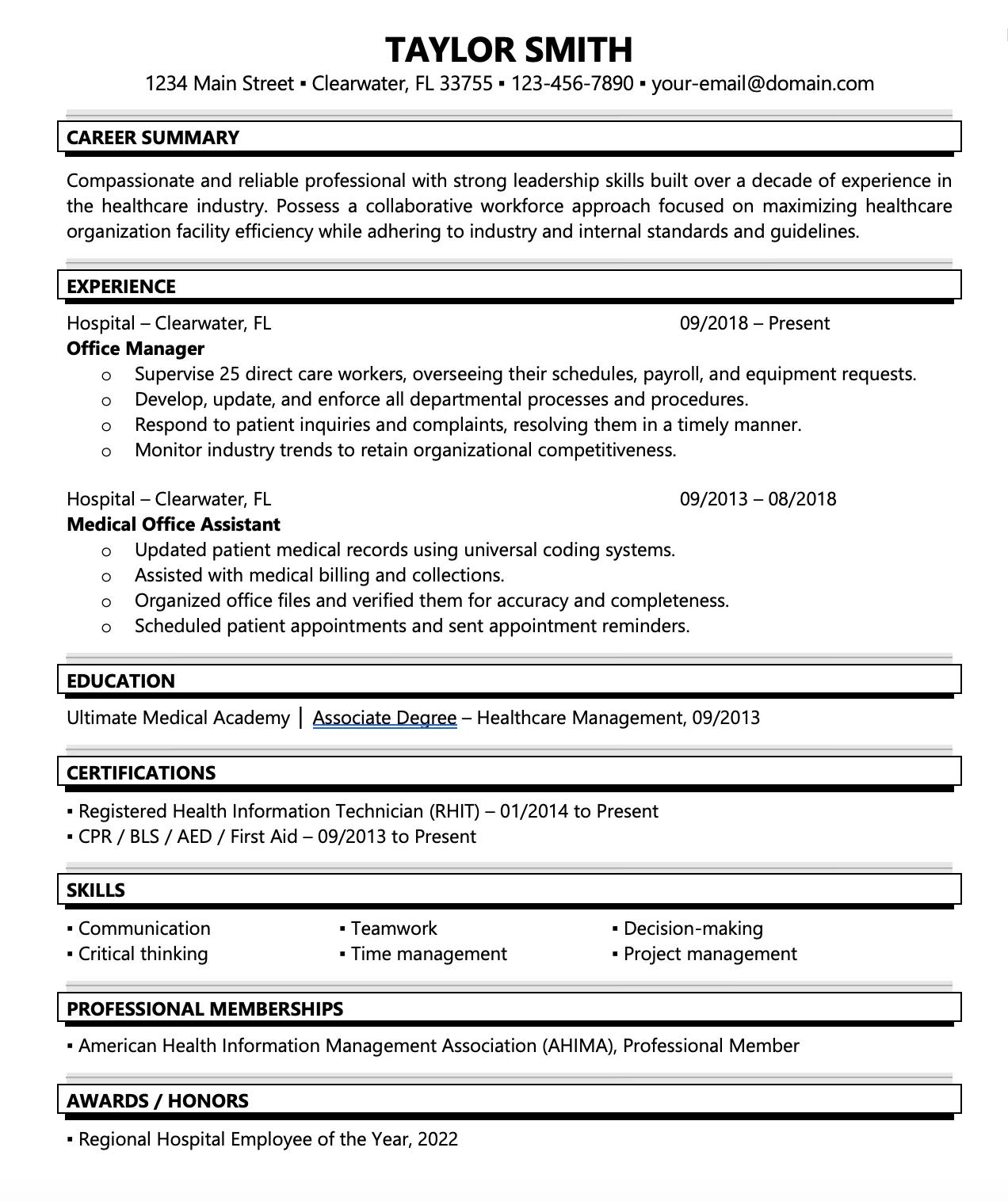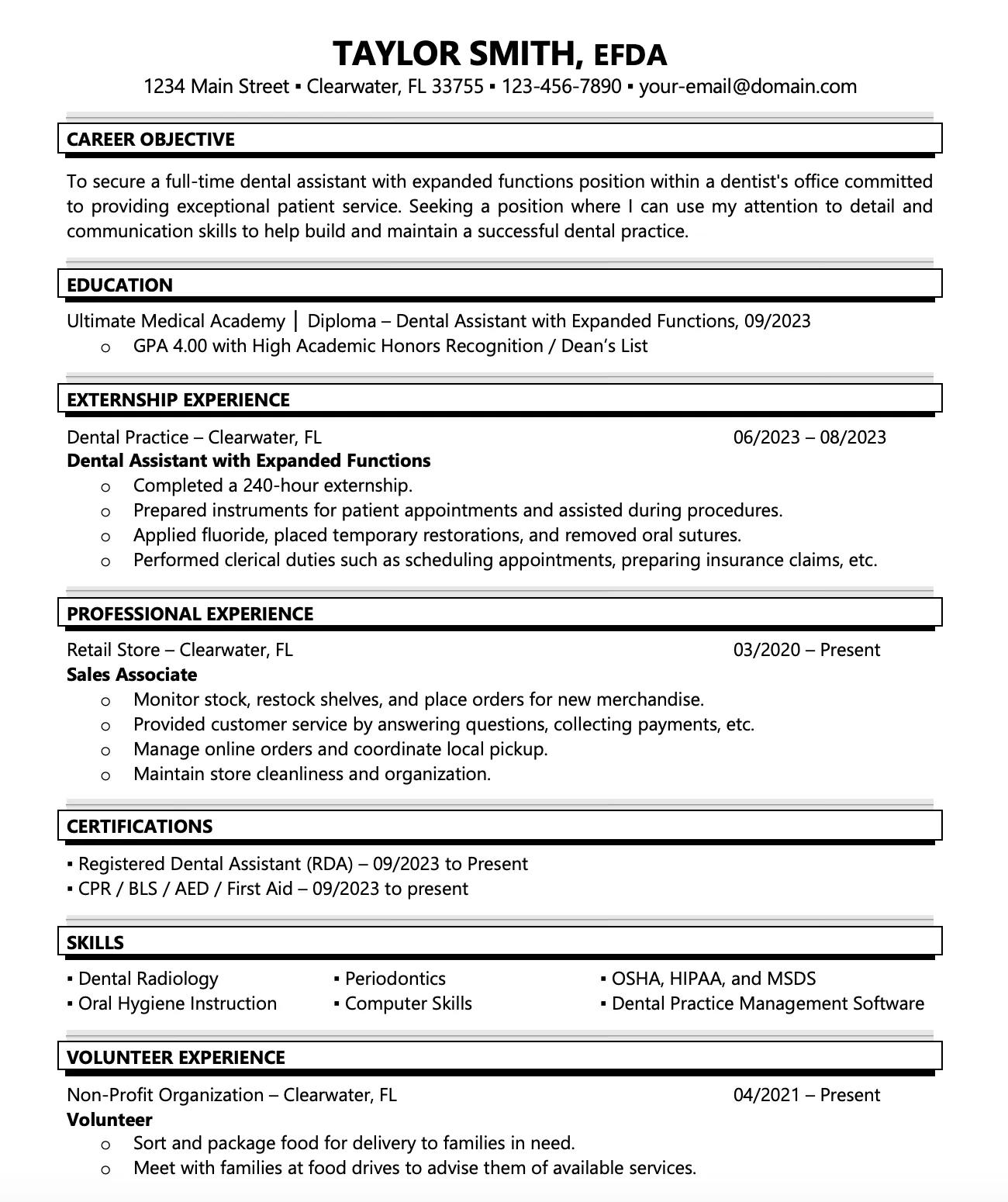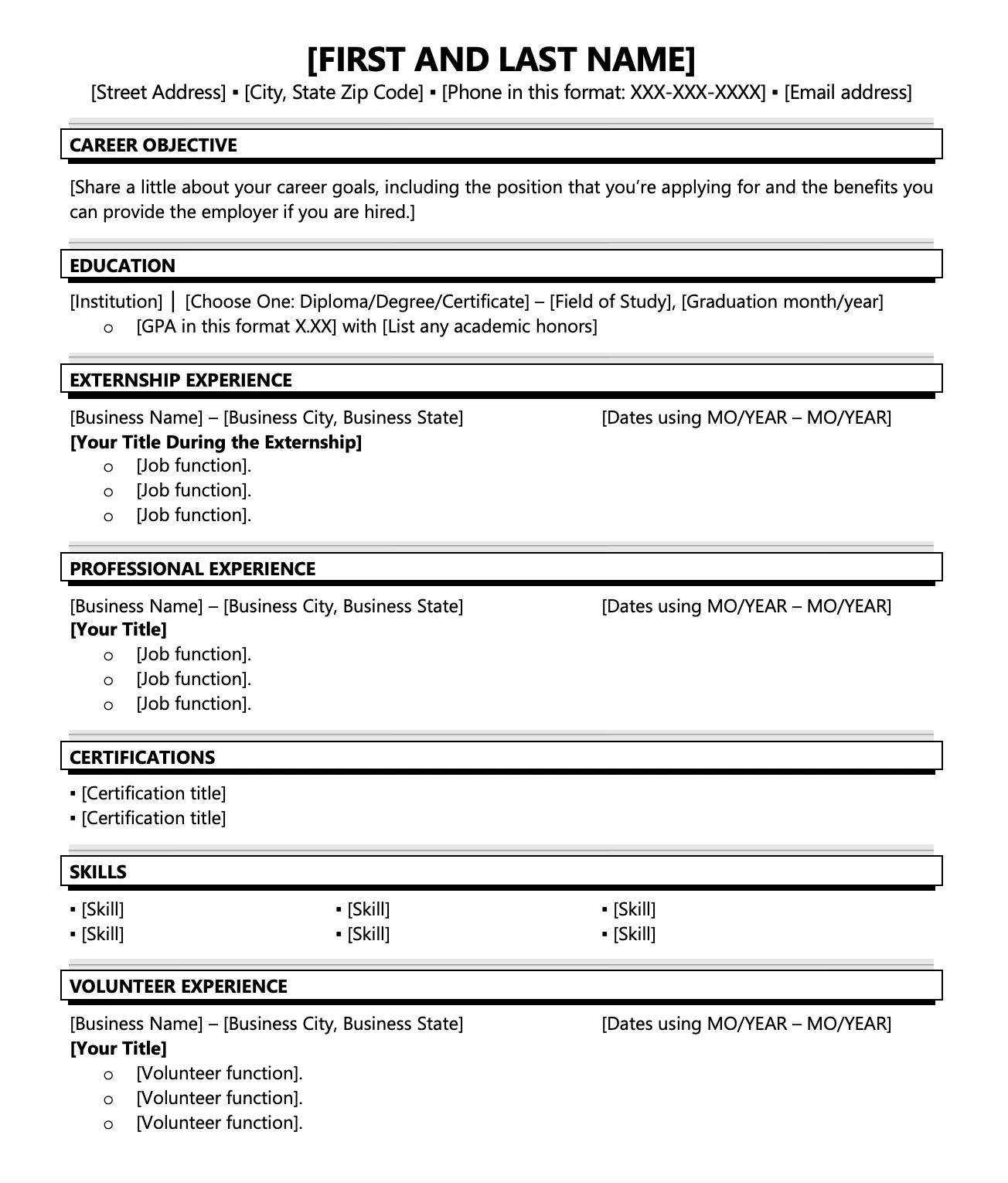Your Guide to Creating a Healthcare Resume

How to Write a Resume for Healthcare Jobs, Including Examples & a Healthcare Resume Template
We often don’t give our resume much thought until we’re actively on the job hunt. That’s when this document suddenly jumps to the forefront of our minds — as it should. Whether you’re currently in the field or a recent grad ready to get their foot in the door, there isn’t a bad time to enhance your resume. In fact, with the current state of the healthcare industry, now is as good a time as any.
Healthcare occupations are expected to have a “much faster than average” growth rate from 2022 to 2032 according to the Bureau of Labor Statistics, resulting in the creation of roughly 1.8 million new positions each year.1 If you’re interested in pursuing a healthcare role, crafting your resume is a good first step – and this guide can help.
In this guide to creating your healthcare resume, we talk about what a resume is and why it is so important. While you likely already have one, clarifying this basic information can give you a solid foundation for creating a resume that helps you better connect with a potential employer.
Next, we offer tips for creating a resume, along with a healthcare resume example so you can get a better idea of what they look like. We even provide a ready-to-use healthcare resume template so you can simply copy and paste it into your word processor, plug in your personal information, review it, and you’ll be ready to submit it to your desired employer.
Sound good? Great! Let’s get started.
What Is a Resume?
The word resume, also sometimes written as résumé or resumé, is defined as “a short account of one’s career and qualifications” or “a set of accomplishments.”2 Submitting a resume is often one of the first steps in the job application process. This document is used to tell potential employers why you’re a good candidate for an open position at their healthcare organization based on your qualifications, experience, education, skills, and career objectives.
Research indicates that, in 2019, there were more filled healthcare support positions than there were job postings; however, by 2021, this trend had reversed with more support-based job posts than individuals holding those positions.3 This highlights that, post-COVID, there is a healthy job market for healthcare support roles such as medical assistant, nursing assistant, and phlebotomist.
A well-crafted resume can help you stand out from other applicants vying for one of these types of open positions. This leads us to our next point, which is why putting time and effort into creating a solid healthcare resume is so important.
Why a Well-Crafted Resume Is So Important
Your resume is likely the first interaction you have with a potential employer. And since it’s recommended that job seekers submit two to three applications daily,4 this also means that two to three hiring managers are going to be developing their first impression of you each day as well.
Even if you don’t hit this number, each time you submit your resume, you have a chance of getting a response or being selected for an interview. The information you include in your resume, and how you choose to include it, can mean the difference between moving to the next step in the hiring process and never receiving that call.
It’s also important to develop a healthcare resume that helps you stand out. You don’t have much time to stand out either. The average employer only spends six to seven seconds looking over an applicant’s resume.5 Not minutes. Seconds. What can they glean from your resume in this short amount of time?
Here are some of the things they look for when doing their initial scan:5
- Your resume format, which helps them assess your ability to organize information while also making the document easier to review quickly
- Your work history, to better identify how long you typically stay in a job role and to ascertain whether you’re an entry- or senior-level applicant
- Your education, to know whether you meet the minimum qualifications
- Other information applicable to the job post, such as if you have the required healthcare skill sets for that position
- A link to your online profile, such as one posted on professional networking sites like LinkedIn if they want to know more
Paying extra attention to these areas of your healthcare resume can help you get the most from your six or seven-second scan. But this isn’t a complete list of all the information your resume needs to contain because, if it is to highlight everything that could make you a good candidate for a specific position, it needs to include much more.
10 Elements of a Strong Healthcare Resume
You can look at dozens of healthcare resumes and each one is a little different. This can make it feel overwhelming when wondering how to create your own. One helpful thing to remember is that a healthcare resume contains most of these 10 elements.
#1: Your Contact Information
Your resume must contain your contact information since this is the information that the potential employer will use to reach you should they decide to advance you in the application process.
Contact information to include on your resume for healthcare jobs includes your:
- Full name. Place your first and last name on your resume. Your middle name or initial is optional but may be helpful if you have a common name or if you want to distinguish yourself from other applicants.
- Phone number. When writing your healthcare resume, provide the phone number where the employer can best reach you. Also, record a professional-sounding voicemail in case you miss their call.
- Email address. Providing your email enables an employer to easily contact you with important follow-up information, such as an interview time, or to request additional information. If you don’t have an appropriate email address, consider getting one. Using your first and last name is a good approach (i.e., firstname.lastname@email.com) and can look better to a potential employer than one that is less professional (i.e., likestoparty@email.com). Gmail and Yahoo! email addresses can be set up at no cost.
While not necessary, it can also be helpful to provide a link to your profile on professional networking sites such as LinkedIn. This enables the employer to learn more about you, also giving you the opportunity to show them that you’re a serious healthcare professional.
#2: A Summary of Your Healthcare Career or Career Objectives
Under your contact information is generally where you’ll add a statement that provides a summary of your career up to this date or your overall career goals. How do you know which one to put on your resume for healthcare?
If you’ve been working in the field for a while and have a lot of experience, a summary can help give a big-picture view of your qualifications. Conversely, if you’re new to healthcare, such as if you recently graduated from a healthcare program, consider adding an objective instead. This tells the employer what you hope to accomplish and, perhaps most importantly, how their job opening fits into your healthcare career pathway.
Here’s an example of a healthcare resume summary:
Caring and reliable healthcare management professional with 10 years of experience in medical billing, staff scheduling, budgeting, and the creation of internal policies and procedures. Looking to strengthen my healthcare leadership skills in a higher-level supervisory role.
Here’s an example of a healthcare resume objective:
To secure a role as a pharmacy technician, where I can use my knowledge and skills to help provide patients access to their needed medications and to ensure that these medications are filled accurately and with the greatest proficiency – all while providing exceptional customer service.
#3: Your Experience
You’ll list your work experience in another section of your healthcare resume. This gives the employer insight into the current or prior roles that you’ve held, in addition to some of the responsibilities you’ve had in these positions that can help you excel in the job they’ve posted.
For each job position, you want to provide:
- Your job title
- The time frame you held that position, using months and years or only years
- The name of the business or organization you worked for
- The work location (city and state)
Under this information, you want to include a bulleted list of your job duties. Highlight any duties related to or that could help you in the job that you’re applying for.
Don’t forget to add quantifiable data. If you’ve worked as a nursing assistant or dental assistant, for example, roughly how many patients did you see each day? Sharing this information can help the employer understand your ability to provide expedient and efficient patient care.
What if you don’t have any healthcare experience, such as if you recently graduated from a healthcare program and are new to the field? In this case, provide any experience you have that has helped you develop skills that would be beneficial to the open job role.
Working in a retail position, for example, can help develop the customer service skills that are important as a pharmacy technician. Or maybe you held a position as a clerk or clerical assistant. Skills learned in these roles can help you as a medical administrative assistant or medical office and billing specialist.
Focus on the skills you developed that are transferable to healthcare (more on that in a minute). Adding this to your resume can help an employer decide if you have the qualities they seek – even if you don’t have healthcare experience.
#4: Your Education
In your resume, you also want to share information about your education. While you can qualify for some entry-level healthcare positions without a diploma or degree, others may require that you complete an educational program. This helps ensure that you have the knowledge needed to perform the necessary job functions.
Generally, the education section of a healthcare resume is fairly short. So, keep it as brief as possible. Information to provide in this section includes:
- The name and location of the institution you attended
- The diploma or degree obtained, including your field of study
- The year you graduated
- Your grade point average (GPA) upon graduation, if it was higher (a 3.5 or above)
- Any academic achievements or honors
Pro Healthcare Resume Tip: If you have a lot of experience in healthcare roles, place that section before your education. If you’re new to the field, however, list your education first – before your experience – to draw attention to the knowledge and skills you developed or strengthened by taking a healthcare program.
#5: Any Licenses or Certifications
If you hold a professional license and/or a healthcare certification, you’ll want to list it on your resume as well. Some regulatory agencies may require you to be licensed to work in certain healthcare positions. Employers may also want you to hold certain certifications to be considered for a specific position.
For example, if you are applying for a medical coding role, the employer may require you to be a Certified Professional Coder (CPC) or Certified Coding Specialist (CPS). If it’s a medical administrative assistant position you seek, the employer may require you to be a Certified Medical Administrative Assistant (CMAA).
Even if certification isn’t required, earning this type of credential offers many benefits. One is that it provides proof of your knowledge and skill set. It also signifies that you can perform the job duties within a particular role. Certifications can even bolster your resume if you have limited experience.
When listing your certification, include:
- The certification title
- The organization you obtained your certification with
- The date you became certified and its expiration date, if there is one
#6: Related Skills
Two types of skills are important for healthcare workers: hard skills and soft skills. Hard skills include technical skills such as knowing how to enter patient medical records into a computer system, medical billing and coding skills, being able to take a patient’s vital signs, and – if you’re a dental assistant – the ability to take x-rays.
Soft skills are more so the personal qualities or traits that can help make you successful in your role. Soft skills important for healthcare include those related to teamwork, empathy, leadership, communication, time management, attention to detail, and organization. Problem-solving and critical thinking are two more beneficial healthcare skills to include on your resume.
Healthcare resume skills are usually provided in the form of a bulleted list. This helps draw attention to each skill while making this section easy to scan.
Although you may be tempted to list every skill you have, brevity is best. Look at the job posting and notice the skills the employer wants. If you have them, focus on those when creating your healthcare resume so it is more tailored to that position. Another approach is to only list the skills that you are proficient in, so the employer understands where your strengths lie.
“Emphasize your strengths on your resume, in your cover letters and in your interviews. It may sound obvious, but you’d be surprised how many people simply list everything they’ve ever done.”
#7: Professional Memberships
If you belong to any professional groups related to the open position, you may want to include this on your resume too. Professional affiliations help highlight your interest in the healthcare field. They can also signify your level of commitment as a healthcare professional.
As an example, one healthcare career option is to work in health information management. Joining the American Health Information Management Association (AHIMA) helps show potential employers that you’re serious about your work.
#8: Awards and Honors
If you’ve received any accolades, either as a healthcare professional or student, you might want to provide these on your resume as well. Healthcare organizations are interested in hiring top talent. Winning awards or achieving high honors can suggest that you are in this category of applicants.
Maybe you worked at a healthcare facility and earned employee of the year. Or you might have graduated from your healthcare program with top honors. List these achievements on your resume. This isn’t being boastful; it’s simply telling the employer that you’re willing to put in the work to do the job to the best of your ability.
#9: Any Volunteer Work
Do you volunteer at a hospital or nursing facility? What about doing regular volunteer work for the American Red Cross at a local blood drive or donating your time to help with patient registration at a mobile medical clinic?
Listing volunteer work on your healthcare serves a few purposes. One is that it’s a good way to share skills you have that can benefit you in the open position. Another is that it suggests that you are a caring and giving person, which are two qualities that are helpful in a healthcare role.
#10: Anything Else That May Be Important
While ensuring that your resume contains the previous nine elements may be enough to highlight your healthcare knowledge and skills, there may be something additional you may want to add. You might also add more information if you don’t have a lot of education and experience, leaving your resume fairly short.
Some information that you might choose to add to your healthcare resume includes:
- Any continuing education courses you’ve taken
- Any research projects you’ve completed or taken part in
- If you fluently speak other languages
What NOT to Put on Your Healthcare Resume
Now that you know what type of information either needs to be or should be on your healthcare resume, it’s equally important to understand what information to leave off. The goal isn’t to deceive a potential employer by not divulging certain information. Instead, it’s more about keeping your resume brief while also offering you certain protections.
With this in mind, here are some things your healthcare resume should not include:
- Sensitive personally identifiable information (such as your birthdate and social security number)
- Every job you’ve ever had (unless they all pertain to healthcare)
- Every duty you’ve ever performed at a job (only the ones relevant to healthcare)
- Your salary at current or previous jobs
- Big blocks of text (small paragraphs and bullet points work best)
- Graphics, images, and photographs (they can detract from your resume and are also hard for resume software to read)
- Reference information (if they want it, they’ll ask for it)
Tips for Writing a Compelling Healthcare Resume
The next step in the resume creation process is to sit down and draft this document. Put all the above information together so that a prospective employer feels compelled to move you forward and invite you in for an interview.
Here are a few tips to help you stand out from other applicants when crafting your healthcare resume:
- Be honest. When you have your heart set on a particular job, it can be tempting to want to embellish your qualifications. However, misrepresenting your education or experience can have serious negative consequences, one of which is a tarnished reputation. This can make getting any other healthcare job harder if word gets around.
- Tailor your resume to the job post. This doesn’t mean that you should add any information to your resume that isn’t accurate. What it does mean though is that if the job post calls for someone with “compassion” or who is “reliable,” adding these words to your resume – if they are true for you – is a good way to show that you hold the skills or qualities that the employer seeks.
- Use action words. When listing your work-related responsibilities, skills, or accomplishments, use action words versus passive words to make this content stronger. These types of words may even help persuade employers to bring you in for an interview. Examples of action words include developed, generated, evaluated, collaborated, coached, trained, managed, or tracked.
- Use keywords. Remember that you only have a few seconds to catch a hiring manager’s attention. Using words that they may be looking for in their quick scan is a good way to get noticed. Additionally, some healthcare facilities use software to screen resumes submitted. This is called an applicant tracking system (ATS) and one of the things this system looks for is keywords.7 These keywords are often mentioned in the job post, which is another reason to tailor your resume to the listing. It can also help to look at the healthcare organization’s website and see if it mentions certain words and phrases.
- Be brief and to the point. When it comes to your resume, release the urge to tell the employer everything and focus on providing only the most important information. Get rid of any words that don’t add value to the document, aiming for as much conciseness as possible. For example, instead of listing “Organized patient medical records to help the organization find the information they needed faster” as one of your job responsibilities, you might write “Organized patient medical records for improved efficiency.” It’s a minor change but it gets your point across faster with half the words.
- Proofread, edit, and proofread again. Imagine that you’re a hiring manager. What would you think if you received a healthcare resume full of spelling and grammatical errors? At a minimum, this suggests that the applicant is okay with poor work quality. Some may even take it as a sign that you’re not capable of doing a good job. That’s why it is so important to proofread your healthcare resume before submitting it with your application. Your word processor may find some errors. You can also use free online spelling and grammar checkers, like those offered by Grammarly, to help catch any errors. Also, ask someone you know to look the document over and see if they notice any problems or issues.
Want More Help? If you graduated from a healthcare program, you may be entitled to receive assistance via their Career Services division or a similar department. If this is an option, reach out and ask if they can help. Some institutions provide help with healthcare resume writing and optimization.
Your Healthcare Resume Format
When it comes to your resume format, simple is best. Although you may want to “spruce it up” with graphic elements, it’s better to leave them off.
Two potential resume formats to consider are the F-pattern and E-pattern layouts. Both of these layouts are designed to use the ways the eyes typically track when reading this type of document.
An F-pattern layout references the fact that most people read in a horizontal line across the top of the page, then drop down the page before reading in a horizontal line again. However, when dropping down, they generally don’t read as far across the page as they did the first time.
An E-pattern resume adds a third horizontal line. In this case, a person would read across the top of the page, drop down and read across the page again, then drop down one more time to scan information closer to the page’s bottom.
Using one of these two formats helps you align your resume with these quick-scan patterns.
Healthcare Resume Examples
Before you get started, it can be helpful to see a sample resume. This can help give you a better idea of what type of information to include, how to format your resume, and more. Seeing healthcare resume examples is also beneficial if you are a visual learner and like to “see” before you “do.”
The first one is an example of a healthcare management resume for a worker who is applying for a higher-level position with the same facility. The second is an example of a healthcare resume that may work better for a recent dental assistant grad who is now looking for a full-time job. Notice how the two are laid out a bit differently, also containing somewhat different information for the job applicant.
Resume Example One
Resume Example Two
Easy-to-Use Healthcare Resume Templates
Now that you’ve seen what a strong resume looks like for both experienced and new healthcare grads, it’s time to create your own. If the idea makes your palms sweat and your heart beat a little faster, don’t worry. We’re here to help.
To make the job-seeking process as stress-free as possible, we’ve created a couple of healthcare resume templates you can use. Simply cut and paste the text for the one that applies to your situation into your word processor, update it with your information, and you’re ready to go!
Here’s a template you can use if you don’t have any healthcare experience and recently graduated from an education or training program:
Resume Template Example
UMA Helps Grads with Resume Creation and Optimization
One service we’re proud to offer UMA grads is helping them with their resumes. We can assist with creating the document itself or, for graduates who already have a resume, we also help with optimization.
This is just one way that we care for our students so they can care for others. It also highlights our commitment to UMA grads – even after they’ve walked down the aisle and collected their diploma or degree.
If you’d like to learn more about UMA’s healthcare programs and services, contact us today. You can take classes at our Clearwater Campus or enjoy one of our many online healthcare programs.
In the meantime, check out these blogs to learn more about how to create the best healthcare resume you can:
- Building a Resume That Makes Employers Want to “Swipe Right”
- 4 Reasons You Have a Resume Gap—and How to Explain Each One
Frequently Asked Questions
- How long should a resume be? Generally speaking, your resume should fit on one page. If you’ve had a lengthy history in the healthcare industry, it may be a bit longer – but you still want to limit it to two pages.8
- What is a CV and how is it different from a resume? A CV (which stands for Curriculum Vitae) provides a big-picture view of your overall career history whereas a resume focuses more on your skill sets.9 CVs are typically more common when applying for an academic job, fellowship, or research program rather than being used to apply for a healthcare position.
- How do you add a resume to LinkedIn? Go to your LinkedIn profile page and, under your name, title, and location, click on the “More” button. In the dropdown menu, select “Build a resume.” That will take you to a pop-up which enables you to upload your resume.
Citations
- Bureau of Labor Statistics. Occupational Outlook Handbook. Healthcare Occupations. https://www.bls.gov/ooh/healthcare/home.htm
- Merriam-Webster. Resume. https://www.merriam-webster.com/dictionary/resume
- Dixon N, Goggins M, Ho E, et al. Occupational models from 42 million unstructured job postings. Patterns. https://www.cell.com/patterns/pdf/S2666-3899(23)00102-2.pdf
- Indeed Career Guide. How Many Job Applications Should You Send Per Day? https://www.indeed.com/career-advice/finding-a-job/how-many-job-applications-per-day
- Indeed Career Guide. How Long Do Hiring Managers Look at a Resume? https://www.indeed.com/career-advice/resumes-cover-letters/how-long-do-employers-look-at-resumes
- Brainy Quote. Resume Quotes. https://www.brainyquote.com/topics/resume-quotes
- Indeed Career Guide. 18 Tips to Pass Automated Screening Resume Software. https://www.indeed.com/career-advice/resumes-cover-letters/automated-screening-resume
- Indeed Career Guide. How Long Should a Resume Be? https://www.indeed.com/career-advice/resumes-cover-letters/how-long-should-a-resume-be
- Indeed for Employers. Resume vs. Curriculum Vitae: Guide for Employers. https://in.indeed.com/hire/c/info/resume-vs-cv-differences
Request Information
Talk with us. Start your journey.
Complete this form and we'll call you to explore options at UMA and answer your questions. We'll also email you info on how to get started. We're with you at every step!
Request Information
Talk with us. Start your journey.
Complete this form and we'll call you to explore options at UMA and answer your questions. We'll also email you info on how to get started. We're with you at every step!
About the Author
 Christina DeBusk
Christina DeBuskChristina DeBusk is a freelance writer who has been providing health and wellness content to healthcare organizations such as the American Chiropractic Association and International Sports Sciences Association (ISSA) since 2011. She obtained her Bachelor of Science in Sociology from Central Michigan University, minoring in psychology. She has also earned several ISSA certifications, including Certified Personal Trainer and Certified Nutrition Specialist, achieving the status of Elite Trainer.
Related Content





